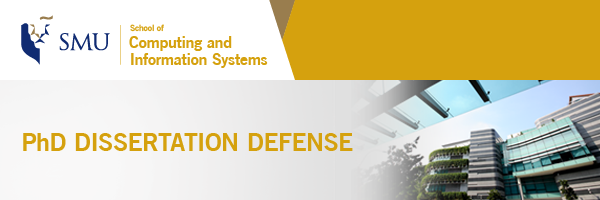| |
 Towards Testing, Detecting, and Debloating Insecure Components in Android Applications. |  | ZHANG Zicheng PhD Candidate
School of Computing and Information Systems
Singapore Management University
| Research Area Dissertation Committee Research Advisor Committee Members External Member - WU Daoyuan, Adjunct Assistant Professor, Department of Information Engineering, Chinese University of Hong Kong (CUHK)
|
| | Date 22 May 2025 (Thursday) | Time 9:30am - 11:30am | Venue Meeting room 5.1,
Level 5
School of Computing and Information Systems 1,
Singapore Management University,
80 Stamford Road
Singapore 178902 | Please register by 20 May 2025. We look forward to seeing you at this research seminar. 
|
|
|
| | ABOUT THE TALK The openness of the Android ecosystem has fueled its success but also expanded its attack surface through insecure and redundant components. This dissertation presents a three-phase pipeline that enhances Android app security, transitioning from vulnerability discovery to clone-based detection and finally to dynamic mitigation via runtime debloating.
In Phase 1, we conduct an empirical study of in-app browsing interfaces (IABIs) across 25 popular apps. Using eight security tests, we uncover systemic flaws: 30% of apps lack adequate URL visibility, most custom IABIs omit trusted indicators, and few warn users about sensitive data input. These findings motivate the need for scalable detection of insecure components.
Phase 2 introduces MtdScout, a novel method-level clone detection tool. Unlike traditional taint or third-party library (TPL) analysis, MtdScout identifies vulnerable method clones, regardless of their location, by generating abstract bytecode signatures and matching them via search trees. It achieves 92.5% precision and 87.2% recall, outperforming existing tools. A large-scale study of 23.9K apps reveals many false negatives missed by LibScout and CryptoGuard, highlighting MtdScout’s unique contributions.
In Phase 3, we propose 3DNDroid, a dynamic debloating framework that disables unneeded and vulnerable DEX and native methods at runtime without APK repackaging. Built on a modified Android OS and a management app, 3DNDroid intercepts DEX method calls and zero-fills native method memory. It supports recovery and is effective even under 5% debloating, eliminating 76K+ Return-Oriented Programming (ROP) gadgets in 55 tested apps.
Together, these phases provide a scalable, practical approach to Android app hardening. By linking testing, clone detection, and runtime mitigation, this work equips stakeholders with tools to uncover, trace, and neutralize vulnerabilities in Android applications. | | | SPEAKER BIOGRAPHY I am a fifth-year Ph.D. candidate in Computer Science at the SMU School of Computing and Information Systems, supervised by Professor Debin GAO. I obtained my Bachelor’s and Master’s degrees in Computer Science from Shandong University in 2017 and 2020. My research interests focus on Android security, system security, and program analysis. During my doctoral period, I have published papers and presented my work in conferences like RAID, EuroS&P, FSE, etc. Outside of research, I enjoy Badminton, which helps me stay balanced and inspired. |
|